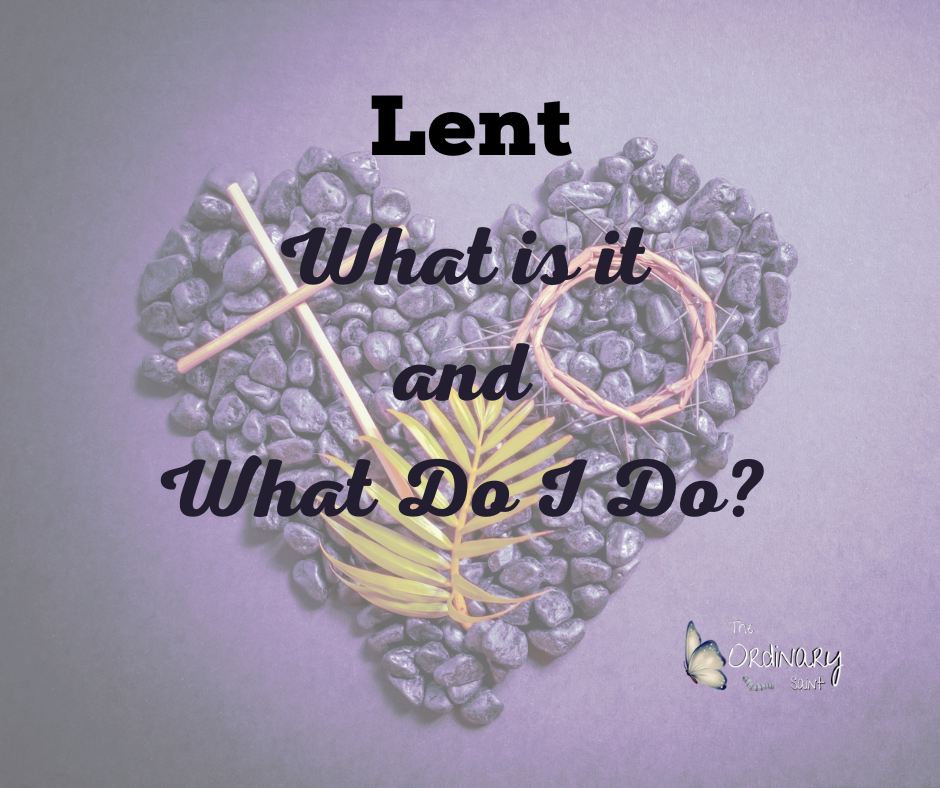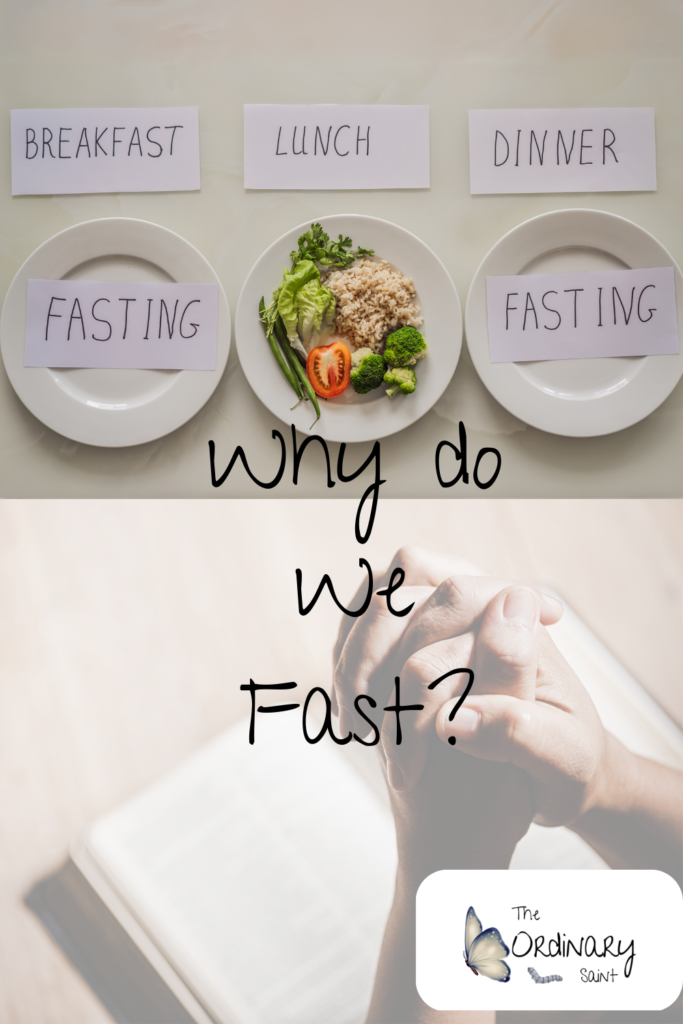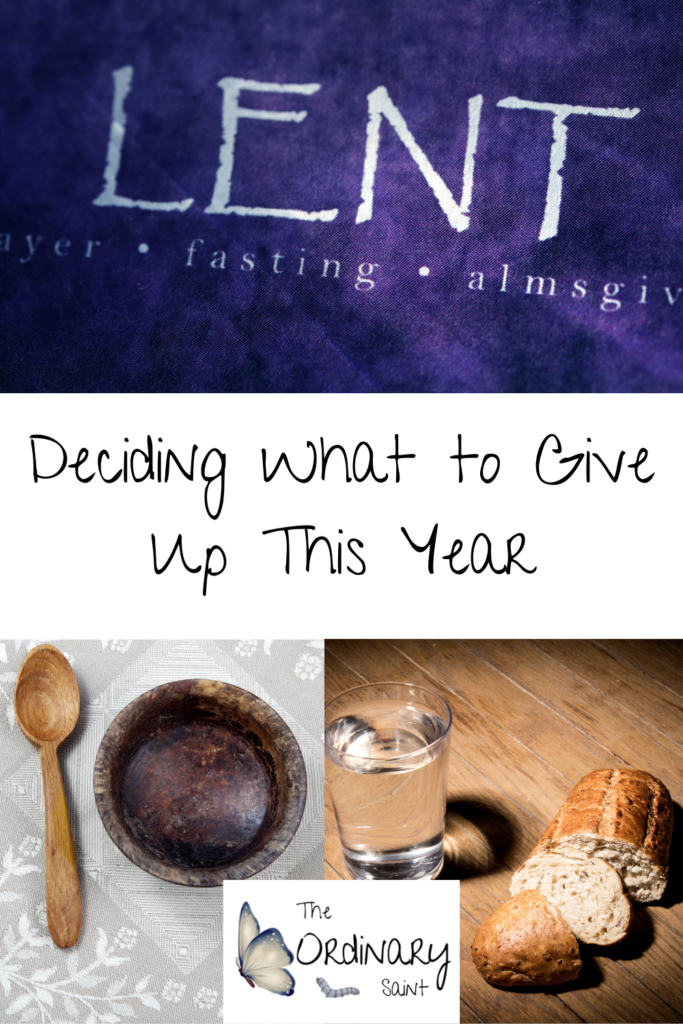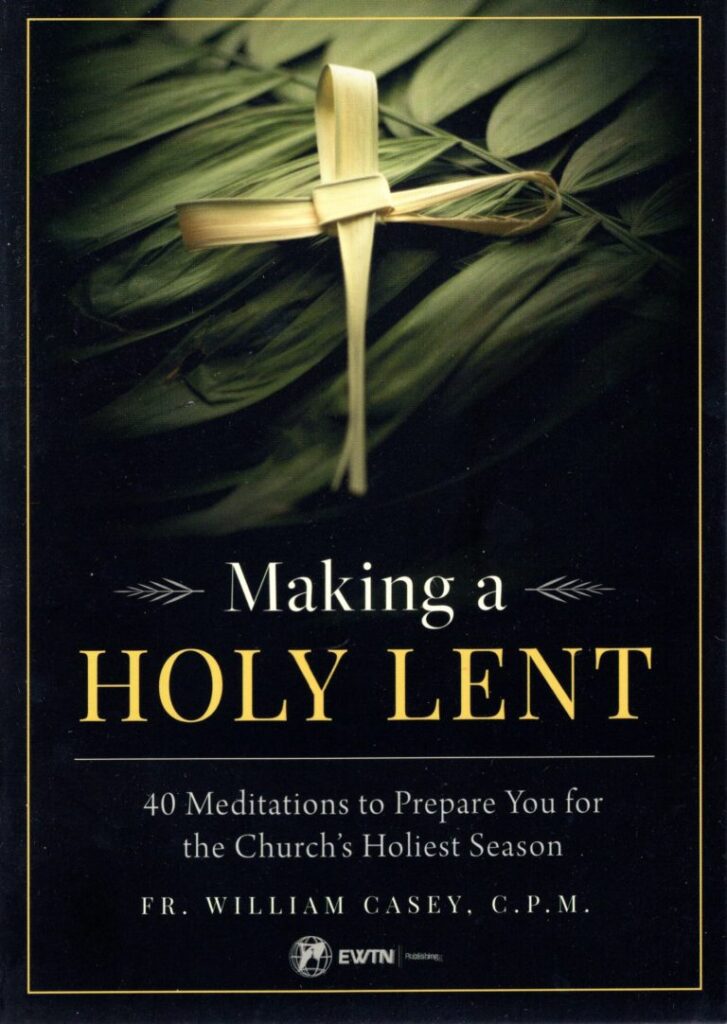
Alright, this is a big one, so grab your cup of tea and settle in for a lengthy read that is packed full of helpful info. Here we go again. We are coming up to the Lenten Season. This is my favorite season of the church year. I know, I know, that sounds crazy town… hear me out… Lent is the time of year when our sole focus is purging of self and union with God. The whole church is purging and in the desert with us, supporting us. This is the time of year when, I feel like, drawing closer to our Lord is the most attainable. Don’t get me wrong, it’s NOT easy, just optimal conditions.
I like to think of Lent as the autobahn of spiritual growth. We are traveling all year long toward Christ driving on interstates, through towns and sometimes on backroads, but Lent is the super highway when the wind is at my back, the sky is clear, there are no towns along the way to slow me down, just The Holy Spirit and me driving toward Jesus. Keep in mind however that there are exits every 30 seconds and signs advertising your favorite restaurants, bars, clubs, sporting events, anything and everything to tempt you off the speedway. If you stay on the autobahn you will make crazy good progress but if you allow distractions, they can sometimes take you right back to the beginning of the highway, right where you started. We have such opportunity, such grace, and tremendous spiritual assistance during this season. Then it all ends in the biggest party of the year.
What are your plans to observe Lent this year? What are you choosing to sacrifice? Are you “taking up” anything? Do you plan to “take off Sundays”?
I feel like Lent sneaks up on me every year. I start thinking about it right after Christmas but then forget all about it and next thing I know, its Ash Wednesday and I am totally unprepared for my Lenten sacrifice. I know you struggle too with what to give up or take up and like me, sometimes, get so absorbed in observing the season that you forget why we observe Lent to begin with. Then there are all the debates “Do you still sacrifice on Sundays or do Sundays not count?” “We have 40 days of Lent but there are 46 days from Ash Wednesday to Easter. So why the discrepancy?”
There are 46 days in the lenten season of the church but not all of the lenten season is Lent. “Lent”specifically refers to the 40 days Jesus spent in the dessert and this is the time which we imitate him by making our own fast. The remaining 6 days are those of Holy Week which is after His calling of the disciples, 3 year ministry, and triumphant entry into Jerusalem. This is the time of his suffering and crucifixion. This is a separate time of fasting and abstinence all its own. Though Holy Week is part of the Season of Lent it is not part of Lent.
Now the question remains “I thought we don’t fast on Sundays” That is correct but not quite so simple. Because Sunday is a mini Easter and a High Feast the church has always forbidden fasting from food and drink on Sunday. However…this is limited to food and drink needed for sustenance. So lets say you give up caffeine for Lent, caffeine is not necessary for your health and wellness. You should still abstain from caffeine on Sundays of Lent. This still allows you water, herbal tea, juice, etc. Perhaps you gave up, sleeping past 6am. You should still get up by 6 on Sundays too. If you are only eating 1 meal a day during all of Lent, then you should disregard this on Sunday while remembering not to overindulge. Keep in mind the purpose for lenten sacrifice (to eliminate that which keeps us from greater relationship with our Blessed Trinity while unifying ourselves and our suffering with Jesus.
What is Lent?
Lent is the time of penance preceding Easter which remembers and joins in the 40 days Jesus spent fasting in the desert and being tempted by Satan. Lent is marked by fasting, penance, and almsgiving.
“And Jesus, full of the Holy Spirit, returned from the Jordan, and was led by the Spirit for forty days in the wilderness tempted by the devil. And he ate noting in those days; and when they were ended, he was hungry.”
Luke 4:1-2
Shrove Tuesday AKA Fat Tuesday?
Shrove is derived from the germanic word, “shrive” meaning to offer absolution after hearing confession. It is a good and traditional practice to make a good confession and be reconciled with Christ to begin the season of Lent.
“This day is commonly called Fat Tuesday because it’s tradition to eat foods made with butter, eggs, and fat such as meat and desserts. It’s a day of celebration before many Catholics give up these delicacies for the duration of Lent.”
-The Dynamic Catholic
In more recent years this has become a day for many to indulge in all the food and drink that they are giving up for Lent, thus the name Fat Tuesday. The danger in this is it often leads to gluttony which is the opposite of what we are trying to accomplish during the season of Lent. We want to root out sin and vice. Rather this is a great day to meditate on your upcoming sacrifice, make final tweaks, go to reconciliation and prepare your heart for a good Lent.

Ash Wednesday
Jesus has just been baptized by his cousin John and the spirit leads him into the desert to fast and be tempted. He spends 40 days there before starting his public ministry.
“And when they drew near to Jerusalem and came to Bethphage, to the Mount of Olives, then Jesus sent two disciples, saying to them “Go into the village opposite you , and immediately you will find a donkey tied, and a colt with her; untie them and bring them to me. If any one says anything to you, you shall say, The Lord has need of them, and he will send them immediately. This took place to fulfill what was spoken by the prophet, saying, “Tell the daughter of Zion, Behold, your king is coming to you, humble, and mounted on a donkey, and a colt, the foal of a donkey.” The disciples went and did as Jesus had directed them; they brought the donkey and the colt, and put their garments on them, and he sat on them. Most of the crowd spread their garments on the road, and others cut branches from the trees and spread them on the road. And the crowds that went before him and that followed him shouted, “Hosanna to the Son of David! Blessed is he who comes in the name of the Lord! Hosanna in the highest!” And when he entered Jerusalem, all the city was stirred, saying, “Who is this?” And the crowds said, “This is the prophet Jesus from Nazareth of Galilee.”
Matthew 21:1-11
Ash Wednesday is the first day of Lent. This is marked by Fasting and Abstinence as well as going to the church to receive ashes on our forehead.
“This day opens the Lenten Season. Catholics go to church to receive the ashes which the priest marks on their foreheads with the words: “Remember, man, that thou are dust, and unto dust thou shalt return” The ashes are from the palms blessed the previous year. They symbolize penance.”
My Catholic Faith
You may notice the church much more packed on Ash Wednesday than any other day of the year. This is because many have come to view the reception of Ashes as a Sacrament. We should remember that the reception of ashes is meant for our remembrance, it is not a sacrament but rather a symbol of our creation, mortality, eternal destiny, and a reminder, for us, that we are created not for this world but for our life after this. (If you would like to know more about what a sacrament is, stay tuned, article coming soon)
Palm Sunday
3 years after Jesus has been baptized, fasted, and tempted, Jesus, with his apostles, enters Jerusalem to an overwhelming and triumphant reception from the people of the city. This marks the beginning of Holy Week which is 6 days of increased penance and sacrifice commemorating the last suffering of Jesus.
It wasn’t until I started writing this article that I looked at the timeline and realized that Lent and Holy Week are separated by Jesus’ 3 year ministry. I always just assumed these events spanned the month and a half of the Lenten Season because that is how they are celebrated. Tell me if you knew this or not. Perhaps I am alone and just a nitwit for never really thinking about this before now.
Holy Week consists of
- Holy Monday
- Holy Tuesday
- Spy Wednesday
- Maundy Thursday
- Good Friday
- Holy Saturday AKA Black Saturday
all culminating in Easter Sunday
*For a beautiful more in depth look at Holy Week from another blogger I came across, click here
*Note* This is why Christians observe our Holy Day on Sunday rather than the original Saturday. Saturday comes from the word Sabbath and is the 7th day of the week when God rested; however, because Jesus is the greatest sacrificial lamb, the long awaited Messiah, and His crucifixion marks the restoration of Mankind after the fall; Because his resurrection marked victory over Satan and death, as well as the end of the Jewish faith, the Sabbath day was moved from Saturday to Sunday (The day of Resurrection). A few centuries later the Jewish faith was revived claiming to still be awaiting the Messiah.
Why do we veil crucifixes and statues during Lent?
“While it may appear counterintuitive to veil statues and images during the final weeks of Lent, the Catholic Church recommends this practice to heighten our senses and build within us a longing for Easter Sunday.”
–www.holyspiritchurch.org
Think of when you have been blindfolded, your sense of hearing becomes more acute. When your ears are clogged and you can’t hear, your sense of physical awareness becomes stronger. This is the same with veiling. When we cannot see holy images, our longing increases as well as our attention to our other senses.

Why do we fast?
“Unless you do penance, you shall likewise perish”
Luke 13:5
“I chastise my body and bring it into subjection, lest perhaps after preaching to others I myself should be rejected”
1 Corinthians 9:27
“Because we are sinners, justice requires each of us to make recompense to God for the honor we have denied Him by our sins. Because we have misused our goods, our souls and bodies – as well as those of others – the natural law requires us to strive to restore the order we have disturbed by our sins. The natural law and the Divine law bind us in a general way to perform acts of penance. In order to help us fulfill this requirement, Holy Mother Church, knowing our weakness and laziness binds us under ecclesiastical laws to perform works of penance at certain times.”
-Roman Catholic Daily Missal
“The Church commands us to fast and to abstain in order that we may control the desires of the flesh, raise our minds more freely to God, and make satisfaction for sin.”
My Catholic Faith A Manual of Religion.
When we fast and deny ourselves, we deny that which binds us to this world thus enabling us to open more of ourselves for God. Fasting is spoken of at length in scripture. Here are a few times when our need for fasting is mentioned in scripture.
“Then the disciples of John came to him, saying, “Why do we and the Pharisees fast, but your disciples do not fast?” And Jesus said to them, “Can the wedding guests mourn as long as the bridegroom is with them? The days will come when the bridegroom is taken away from them, and then they will fast.”
Matthew 9:14-15
When speaking of exorcizing demons… “And he said to them, “This kind cannot be driven out by anything but prayer and fasting”” Mark 9:29
“Beware of practicing your piety before men in order to be seen by them, for then you will have no reward from your Father who is in heaven. “Thus, when you give alms, sound no trumpet before you, as the hypocrites do in the synagogues and in the streets, that they may be praised by men. Truly, I say to you, they have their reward. But when you give alms, do not let your left hand know what your right hand is doing, so that your alms may be in secret; and your Father who sees in secret will reward you. “And when you pray, do not heap up empty phrases as the gentiles do for they think that they will be heard for their many words.
-Matthew 6:1-7
What is fasting vs abstinence?
Fasting is the limiting of food and drink. As Catholic Christians we are required, at the very least, to fast on Ash Wednesday and Good Friday. This means we limit our food intake to 1 full meal and 2 smaller meals that, together, do not constitute a full meal.
Abstinance
“A day of abstinence is a day on which we are not allowed the use of meat. On such days we are forbidden all flesh meat, including meat soup and gravy. Flesh meat is the flesh of warm-blooded land animals including birds and fowls.”
-My Catholic Faith
This means that any animal which lives in the water is allowed. Abstinance is required on Ash Wednesday, Good Friday and every Friday of the year (excluding Solemnities ie: First Class Feasts). With the implementation of Vatican II many Catholics strayed away from this and kept abstinence only during Fridays of Lent as it was less commonly taught and encouraged by the religious. Fasting during Fridays outside of Lent was never abolished, however, and many Catholics are coming back to the practice.
It is also becoming more common amongst the faithful, for those abstaining, to abstain from all meat, whether land or sea, as eating seafood rather than beef is not much of a sacrifice for many of us; so we choose to eat completely vegetarian on days of Abstinence. This is a personal preference and not part of official church teaching. It is important to note, though, that if you are going to the local Long John Silver or other fish place, and eating your weight in fish, this is missing the point.
“ The Church does not command abstinence and fasting because she considers meat and other foods evil in themselves. We merely deny ourselves for the glory of God and the good of our souls.” “Abstinence is that moral virtue, related to the cardinal virtue of temperance, which keeps within bounds use of and pleasure in foods or drink…A temperate man eats only what he needs, does not fully satisfy his appetite, and is not dainty about the kind of food he eats. The virtue of abstinence is opposes to the sin of gluttony.”
-My Catholic Faith
I don’t know about you but this came as a big kick in the bum for me. Coming from the age old tradition of “You better finish your plate! There are hungry kids in Africa who would love to have as much food as you”, I had never been taught to eat only as needed but not to fully satisfy my hunger. This is a very different school of thought than what we are taught here in America!
Who is bound to Lenten sacrifice?
“The law of Abstinence bound all Catholics, beginning on the day after their seventh birthday. The law of Fasting bound all Catholics, beginning on the day after their twenty-first birthday and ending at the midnight which completed their fifty-ninth birthday. (Note: The current law requires those who have turned eighteen to fast in most countries)” including the US.
“Those of weak health, the sick, the convalescent, nursing women, the very poor, and those engaged in hard work are excused from fasting. One in doubt as to his duties should consult pastor or confessor.”
-Roman Catholic Daily Missal

How do I decide what to ‘Give up’ and why do I need to?
We ‘give up’ during Lent as a means of penance. Though it is not required it is strongly recommended and highly beneficial for spiritual growth. Again this is part of the autobahn.
Since the purpose of giving up is penance and closer relationship with God, we should look at our daily life and ask, what is distracting me from time with Jesus? What is preventing me from greater relationship with God? Chocolate is all well and good for a seven year old to start grasping the concept of sacrifice and penance but it does nothing for us as adults in rooting out sin. Let’s be a bit more creative and thoughtful in our penance. Below are some ideas to get you started.
Since I am such an over-achiever…ha!, I tend to be overzealous in my penance. I take on 2 or 3 sacrifices, then when I falter, I feel like a huge failure and give up my penance all together.
Don’t take on too much. Choose ONE thing. No sacrifice is too small and it is better to accomplish small penances than to take on too much and give up due to discouragement. The more little things you accomplish the more confidence you will find in doing greater things. Just make sure it is a challenge but reasonable.
Ideas for sacrifice
Give up (possible sin/vice vs virtue)
- Negative Speech (anger, pride, despair vs humility, temperance, charity)
- Swearing (anger and pride vs humility and temperance)
- Excessive sleep (Sloth vs temperance)
- Television (this can be an occasion for every sin)
- Technology (this can be an occasion for every sin)
- Flesh meat (for all of lent) (this is a great penance to increase temperance and fortitude)
- Caffeine (caffeine can be a distraction as well as addictive) Giving up an addiction of any kind is a sacrifice worthy of Lent (gluttony/addiction vs temperance)
- Hot Showers (this is a great penance to increase temperance, fortitude and self denial)
- Eating Out (Make all your meals at home) (sloth or gluttony vs temperance)
- Making purchases that are not necessity (gluttony vs prudence and temperance)
- Yelling when angry (Anger vs charity and meekness)
- Playing video games (gluttony, sloth, anger vs temperance)
- Listening to inappropriate music (lust, anger, despair vs chastity, fortitude, temperance)
- Listening to music in the car (this could be replaced by prayer time)
- Gossiping (see my post on Gossiping by clicking here) (anger, pride vs charity, humility)
- Wearing make up (this is a effort to root out the sin of vanity) (vanity, wastefulness vs humility and temperance)
- Online shopping (wastefulness vs temperance)
- Seclusion (this would be a great opportunity to grow in charity and service)
*Note* It is a common practice to replace what you are giving up with a holy endeavor such as service, spiritual reading, prayer (something that brings you in better relationship with God).
Other ideas to bring observe Lent in my home.
- Choose a Patron saint to pray with during lent and place a statue, image, or prayer card of them in a prominent area of your home.
- Make the Stations of the Cross every Friday or everyday at 3pm
- Go through your closets and home and donate things you no longer need.
- Cover your own holy images with purple cloth.
- Volunteer at a homeless shelter or soup kitchen
- Make sandwiches to hand out to the homeless
- Cook or bake for someone in need (sick, just had a baby, recently returned from the hospital.
- Cook for your priest. They are super busy during this season and a home-cooked meal they don’t have to spend time preparing is a welcome gift. (Consider food restrictions and if they are abstaining from meat for Lent)
- Gather non-perishables to donate to the local food pantry
- Make it to your parishes Penitential Service (See if you can offer someone a ride that cannot drive themselves
- Interrupting people when speaking (pride vs humility)
Recommended Devotional for Lent
click image to follow link to purchase

